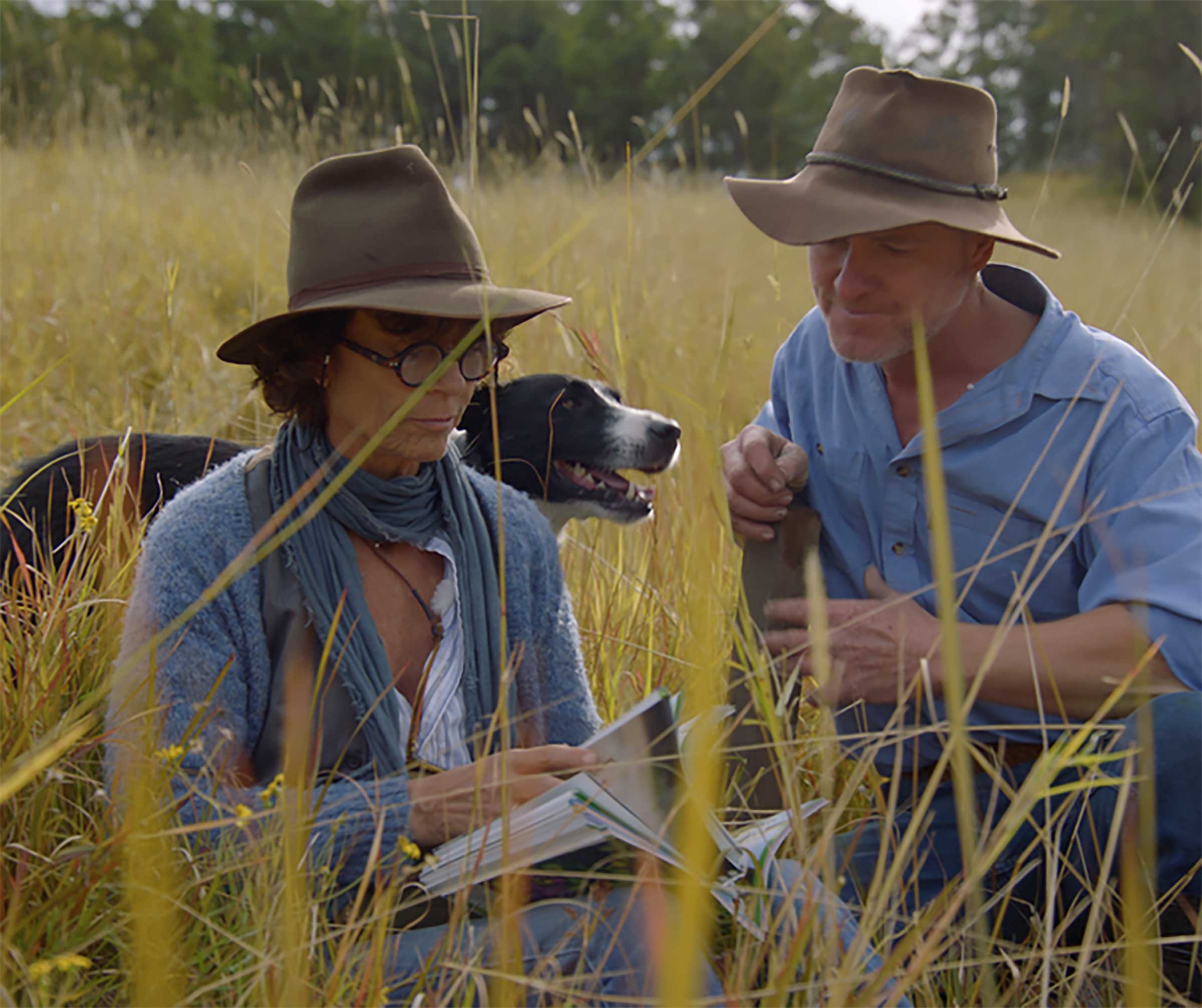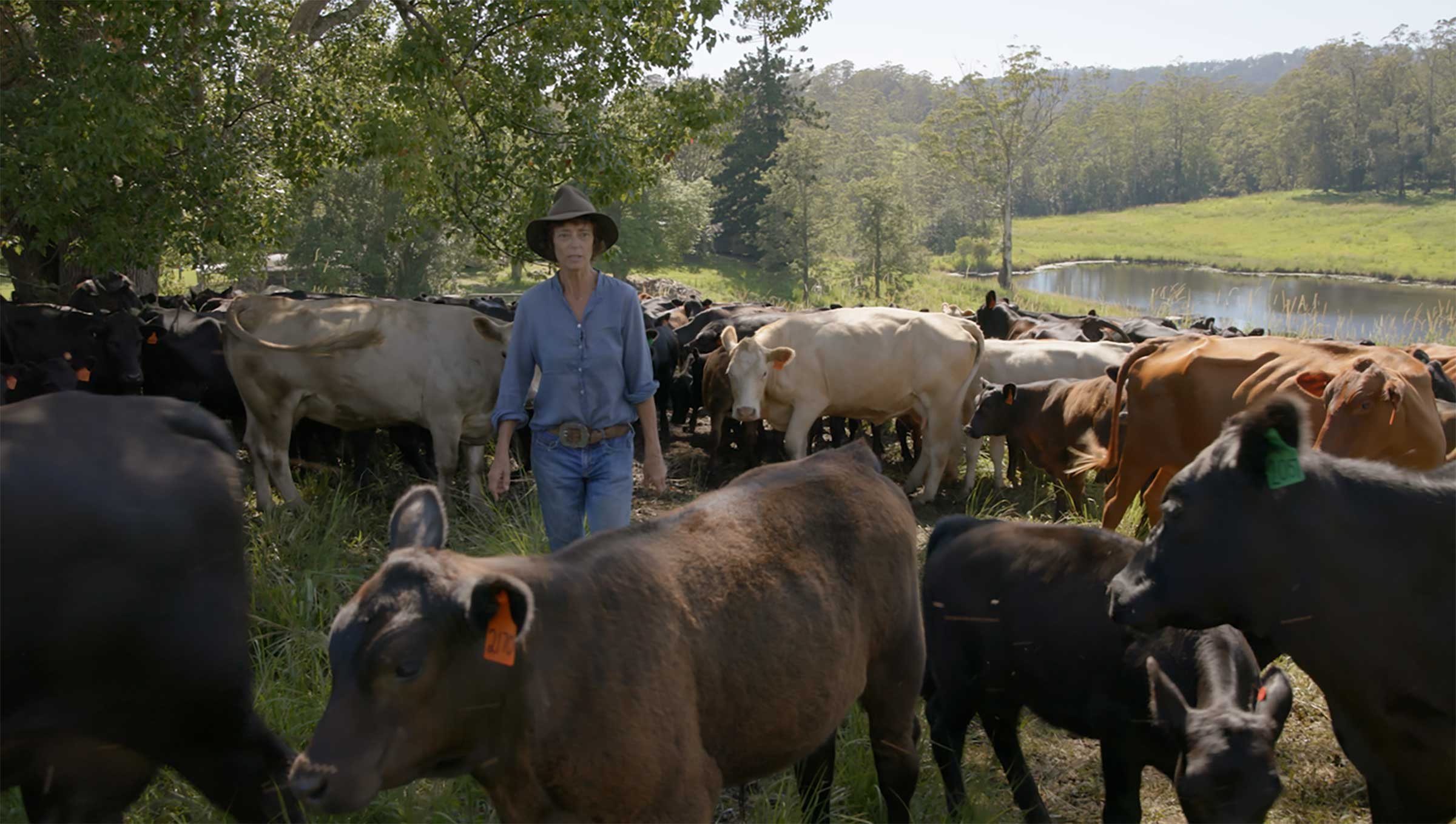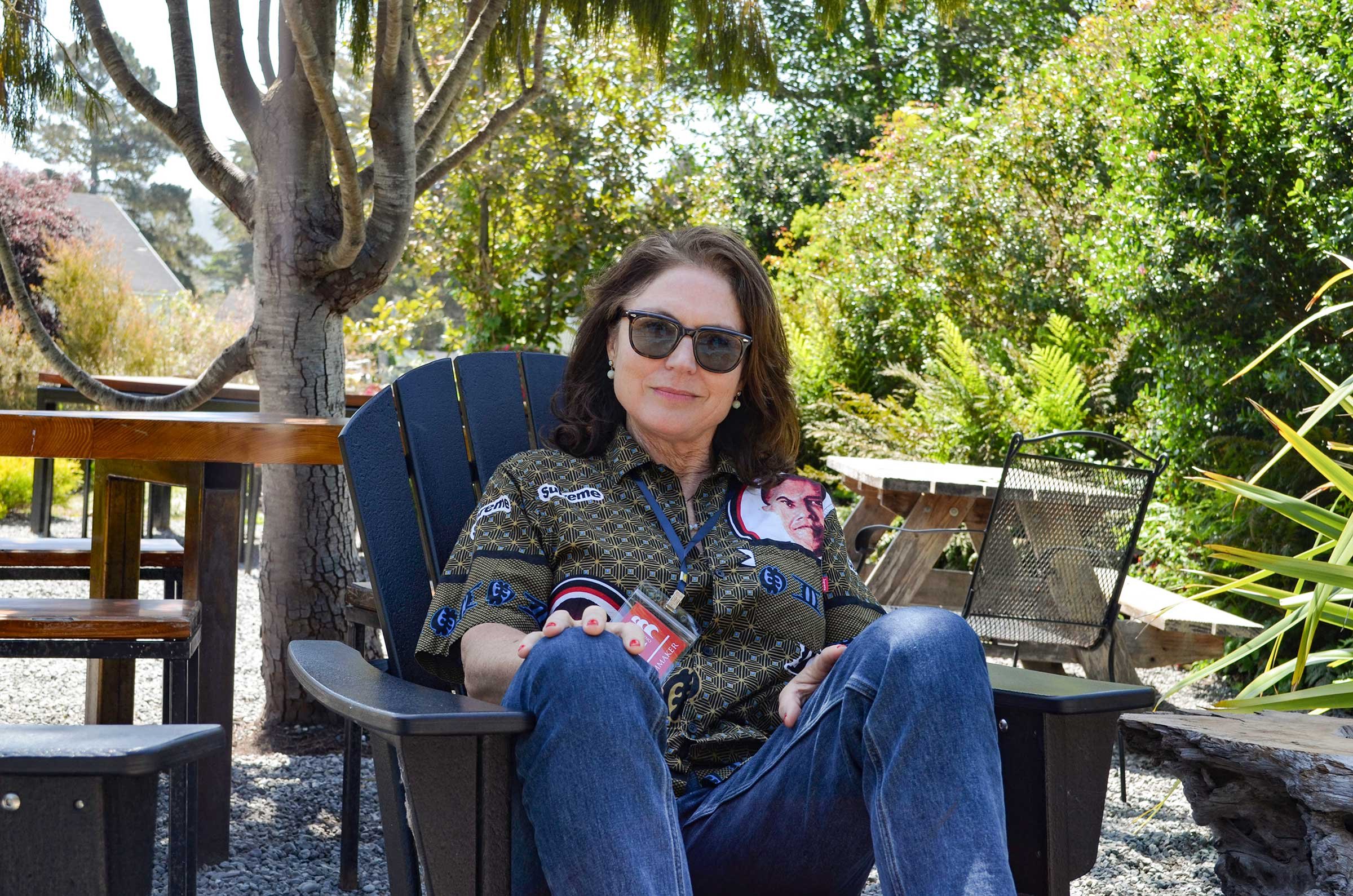Rachel’s Farm

An Australian Actor/Director Turns to Regenerative Farming to Address Climate Change
by Torrey Douglass
There are events—sometimes tragic ones—that are the mental equivalent of blowing a fuse, a soft pop followed by a plunge into disorienting darkness. It can happen when we bear witness to more devastation than we are equipped to comprehend. Such was the response of the people of Australia and around the world when the bushfires erupted across that continent in the summer of 2019/2020. The disaster burned 26.4 million acres and killed or injured almost 3 billion animals, along with 34 humans. For many, what had been a disturbing but distant theory—climate change—shape-shifted into brutal, inarguable fact.
Actor and director Rachel Ward owns an 840-acre property in the Nambucca Valley, a gorgeous region of rolling hills, lush rainforest, and coastal beauty in the Mid North Coast of eastern Australia. She’s been married to actor Bryan Brown for 40 years, during which the farm served as a restorative escape for them and their three children. Their neighbor, Mick Green, ran cattle on the land using traditional ranching methods, a practice Rachel didn’t think to question until the fires raged along their property line, consuming nearby structures and threatening their own.
Their land was spared, but the fires left Rachel with a heavyhearted despair. What about next time? What kind of planet was she leaving to her new grandchild? What could one person do to reverse the ecological ruin brought about by climate change?
According to the United Nations Committee on World Food Security, at least 13% of the world’s carbon emissions are caused by agriculture and forestry. Learning that her ranch was exacerbating, rather than addressing, climate change did not sit well with Rachel, so when Mick suggested they change their livestock management practices from one that contributed to climate change to an approach that would help mitigate it, she was decidedly interested.
In previous years, land on the farm used for growing feed for the cows was treated with herbicide in order to kill the wild-grown plants, then tilled and planted with grass seed. But exposing the underground soil to air and light through tilling destroys its biodiversity, wiping out the community of microbes, fungi, plants, vertebrates, and invertebrates that live underground and create the ecosystem that provides nourishment to the plants above. Tilling also releases both moisture and carbon out of the soil and into the atmosphere, leaving depleted, lifeless soil behind, forcing the farmer to apply chemical fertilizers to sustain the new seeds.
In contrast, Mick suggested they switch over to regenerative farming, a collection of practices designed to mimic rather than override the natural processes that are already in operation, sequestering carbon, restoring soil health, and increasing its capacity for absorbing moisture, which reduces the impact of both droughts and floods on the land. While cattle are often portrayed as climate culprits, they can actually be partners in this approach, benefiting the land if they are intentionally managed. By dividing the grazing areas into small paddocks and moving the cows through quickly, the animals leave nourishing outputs behind to feed the soil without causing damage through overgrazing.
While her husband enjoyed spending time with the family on the farm, its operations and management were Rachel’s responsibility alone. So it was Rachel who dove headfirst into learning about regenerative farming, its challenges and its benefits, ultimately deciding to pursue it with the single-minded devotion of someone who knows there is no time to waste. Not one to pass by an opportunity to share good ideas, she decided to apply her storytelling skills and make a film about the experience, documenting the farm’s transition and interviewing experts along the way.
Rachel’s professional experience was primarily narrative film, so she attended the Melbourne Documentary Festival in the summer of 2020 to look for potential partners. It’s there that she met Bettina Dalton, an Australian documentary producer and director, as well as the Executive Producer and Principal of WildBear Entertainment. Bettina specializes in wildlife documentaries, and her projects have been produced for companies like Disney, National Geographic, and the Discovery Channel.
Bettina says that she realized the power of storytelling while working with David Attenborough early in her career, but she acknowledges that “Shooting those films without people gave an idyllic impression of the natural world so viewers thought everything was fine, whereas off screen there were significant environmental issues that needed attention.” As a result, Bettina includes what she terms “the human element” in her films. “I like stories where the protagonist shifts gears from being part of the problem to part of the solution,” she reflects. “And Rachel is a formidable, incredible individual.” Their meeting allowed the two women to combine their different skills around a shared passion, and the film Rachel’s Farm was the result.
Two significant scenes in Rachel’s Farm capture the soil tests performed by The Savoury Institute’s EOV (Ecological Outcomes Verification), both before and after Rachel and Mick enacted regenerative farming practices. Between those scenes, the film depicts the many struggles, stumbles, and successes they experience along the way. The transition is difficult, involving flood damage, serious injury, and compromise when an infestation of Buffalo flies torment the herd to distraction, requiring the use of chemicals outside of regenerative principles. At one point the expense involved forces the layoff of Mick’s ranch hand, with Rachel stepping into the role with considerably less experience and physical strength. But she is enthusiastic and undeterred, and Mick is patient and persistent, and together they experiment with a variety of measures that begin to yield results.
The film is sprinkled with reflections by various experts, including Charles Massy, an Australian rancher and proponent of regenerative farming who stopped using chemicals on his family’s farm in 2000. Since then, wildlife has emerged on his land that he never saw there as a child, a sign that nature is coming back into balance, a process he documents in his book Call Of The Reed Warbler: A New Agriculture, A New Earth. When Bettina reflects on the current lush abundance of Rachel’s farm—now achieved without chemical inputs—she quotes Massy’s statement that “We have to take our foot off nature’s neck” to allow the natural processes to work on behalf of the farmers’ goals.
When asked how Rachel’s farm is doing now, Bettina smiles as she comments, “It’s going gangbusters.” Rachel has been able to return to working on film projects, leaving the ranch management to Mick. Without the expense and labor involved in chemical inputs, he primarily moves the cattle between the small paddocks of lush grasses. The land is healthier, more resilient in the face of floods and fire, and cheaper to manage,* but getting there was not easy. For this reason, Bettina advocates for banks and insurance companies to provide interest-free loans to support farmers who are transitioning to regenerative farming. Considering that the land is more stable and productive, with less boom and bust—as well as less vulnerable to natural disasters—it would benefit these institutions financially to support regenerative practices in agriculture, not to mention how it would benefit all of us by addressing climate change.
Making a film is a lot of work, and after it’s released to the public, that work shifts from creation to promotion. Throughout this fall, Bettina and Rachel will be screening Rachel’s Farm across the United States, ending with a bipartisan screening in Washington, D.C., in December that coincides with the vote on the latest farm bill. The film screened at the Mendocino Film Festival back in June, but if you missed it, they are touring the West Coast in September and October 2023.
When facing the challenges of climate change, hope can feel a little thin on the ground. But with success stories like Rachel’s, demonstrating how farms can be profitable without damaging the soils on which they rely, long-term, practical solutions seem within reach. As Bettina says, “Nature has the power to recover. We just have to give it a chance.”
*See AusFoodFarming.com.au/regenerative%20agriculture.php for details.
Catch a screening of Rachel’s Farm during the film’s West Coast Tour in September and October of 2023. Details at theregenerators.org/rachels-farm.
Torrey Douglass is a web and graphic designer living in Boonville with her family. Her life’s joys include reading by the fire, cooking something delicious, and drinking good coffee with a friend.
Bettina Dalton photo by Torrey Douglass. All other photos courtesy of Rachel’s Farm.



